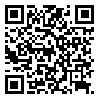BibTeX | RIS | EndNote | Medlars | ProCite | Reference Manager | RefWorks
Send citation to:
URL: http://jdisabilstud.org/article-1-1613-en.html
Background & Objectives: One of the disabilities and abnormalities of marriage that causes psychological problems, indifference and divorce are marital conflict and the inability to solve conflicts. Considering the role of emotion and emotions in marital life, and considering that Emotional couple therapy approach and Guttman cognitive–systemic couple therapy approach in recent years has been very effective in couple’s therapy, doing comparative research in this regard Determine the strengths and weaknesses of each one more than the other and determine the appropriate treatment for solving couples conflicts. According to researches, a research which compares the effectiveness of these two approaches in the field of balance of affect and harmony–marital dissonance has not been found. Therefore, the aim of this study was to determine and compare the efficacy of emotionally focused couple therapy and Gottman's cognitive–systemic couple therapy was on the balance of affect of conflicting couples.
Methods: In this research, a semi–experimental design, pre–test and post–test design with two experimental and one control groups were used. The statistical population of this study was all contradictory and disadvantaged couples (Levels 1, 2 and 3) referring to counseling and private psychology centers in 2nd and 5th district of Tehran in 2019. From this community, 60 people were randomly selected and randomly assigned to three groups (20 subjects), Experimental groups 1 and 2 and control group. The criteria for subjects to enter the research were: informed consent to participate in the research; People with a history of 1–10 years of married life; having a marital conflict without legal and judicial action for separation and not being in the process of divorce and settlement and separation; No psychiatric disorder. The criteria for withdrawing the subjects from the research were unwillingness to continue participating in the research and legal action for divorce. In pretest and posttest, Positive and Negative Affect Scales (PANAS) (Watson et al., 1988) was used for each of the three groups. The emotionally focused couple therapy sessions in seven sessions for Experimental group 1 and Gottman’s cognitive–systemic couple therapy in seven session sessions for experimental group 2 were performed, but no intervention was applied to the control group. Data analysis was done using covariance analysis to measure effectiveness and Bonferroni's post hoc test to check the two–by–two difference between the mean scores of the three groups in the post–test in SPSS version 23. The significance level of the tests was 0.05
Results: The results of covariance analysis showed that both groups of emotionally focused couple therapy and the Gottman’s cognitive–systemic couple therapy had a significant effect on the balance of affect (increase of positive affection and negative emotional loss) of conflicting couples (p<0.001). The results of Bonferroni test showed that the efficacy of emotionally focused couple therapy was more than the Gottman’s cognitive–systemic couple therapy (p<0.001).
Conclusion: According to the findings, the emotionally focused couple therapy based on Johnson's theory has a greater effect on couples' affect balance than Guttman's cognitive–systemic couple therapy. Therefore, the emotionally focused couple therapy can be used to increase the affect balance of couples.
| Rights and permissions | |
 |
This work is licensed under a Creative Commons Attribution-NonCommercial 4.0 International License. |





